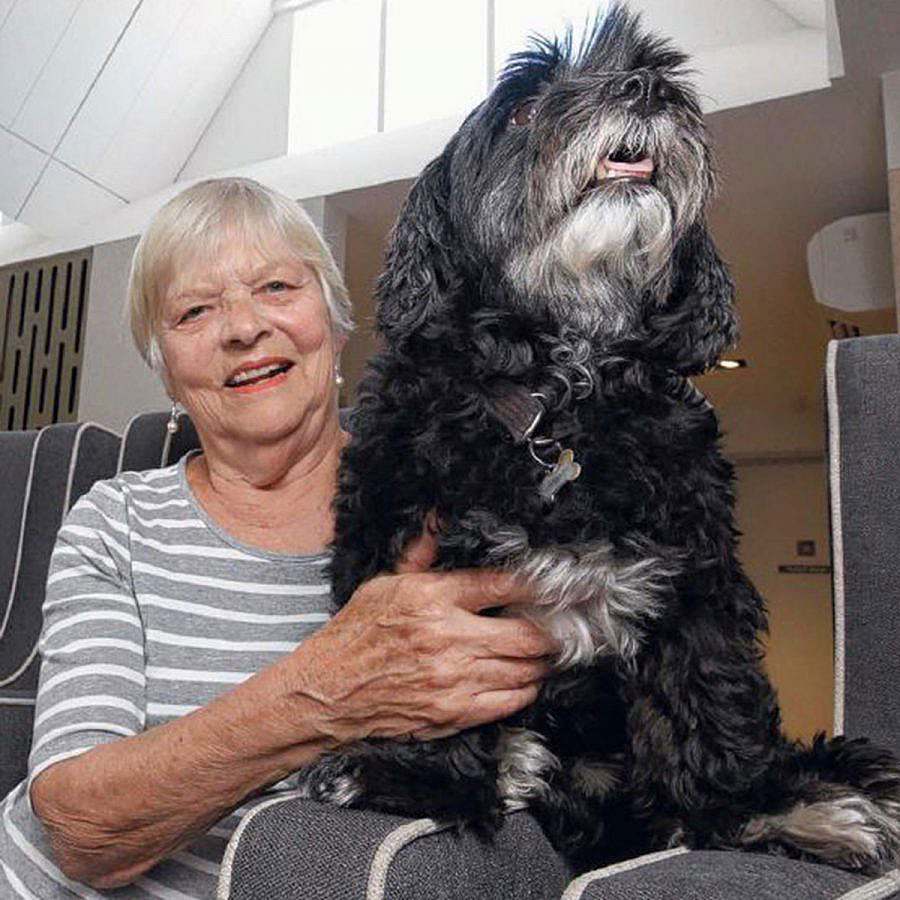
By SHANNON STACEY
Mr Wendell is no ordinary six-year-old Havanese dog. He holds the important title of Community Engagement Coordinator at Broughton Hall, a residential aged care facility in Camberwell, Victoria.
The positive impact of the human-animal bond is supported by scientific data, case studies and research that validate the therapeutic effects of human-animal relationships. These benefits can be emotional, psychological, physical and spiritual.
Broughton Hall’s Lifestyle Coordinator knew having a dog would have enormous benefits for the residents, allowing them to recount many fond memories of their own beloved pets.
Each Sunday evening, they would watch the Lort Smith Dog of the Week television segment and it prompted them to visit the Lort Smith website.
That’s when they saw Mr Wendell’s profile. He was a small-sized dog, great with people and cats, and he had a calm, warm nature. He was five years' old and well past the puppy stage of jumping all over people.
They just had to meet him!
Mr Wendell received lots of interest from potential adopters but the staff at Broughton Hall were successful and consider themselves the “lucky ones”.
Mr Wendell settled in well and is thriving. He is a huge hit with all of the residents. At each shift handover, he is considered just like a resident. He even has his own care plan.
When a new resident comes in, Mr Wendell goes up to them as if to say ‘I will comfort you’ and the calming effect is immediately visible. He goes on outings with the residents; walking, in the bus, and to the local coffee shop.
Acting as their therapy dog, his company is enjoyed by everyone. This is especially evident for residents with dementia. Their faces light up when they see Mr Wendell. It is amazing for family members and staff to witness such positive outcomes.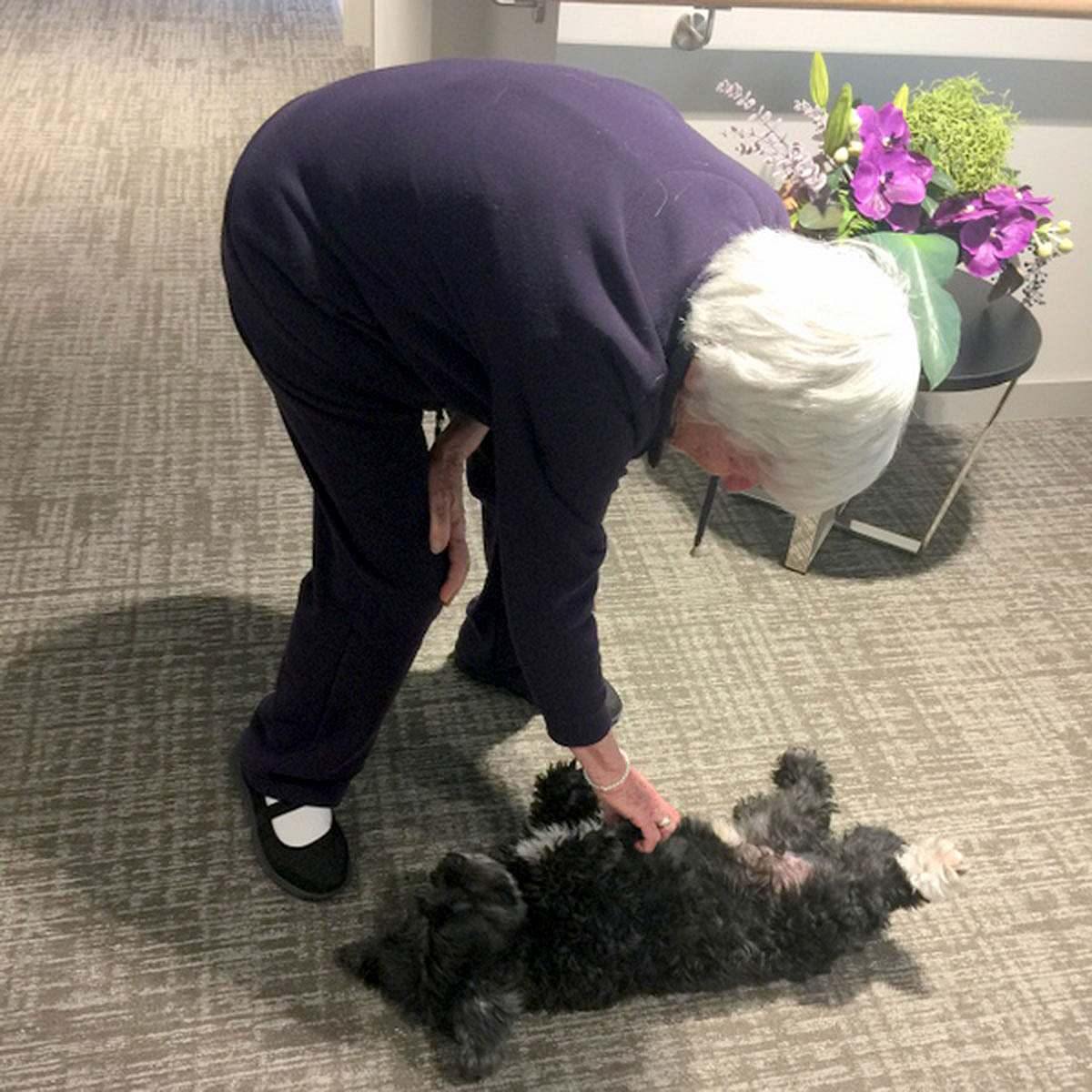
At Lort Smith, we believe and promote the benefits of the human-animal bond, which go beyond companionship. This bond refers to the strong positive interaction that exists between humans and animals – that special cohesive bond that actually enhances our quality of life.
Each day, Mr Wendell shadows the Lifestyle Coordinator on her rounds. This allows all of the residents to benefit from his company and, in return, he is showered with love and affection.
One nurse now brings her boxer to work and the physiotherapist has started bringing in her new puppy, further enhancing the wellbeing of staff and residents. Mr Wendell isn’t too fussed by the extra canine company. He much prefers the camaraderie of his people - his family - without whom he couldn’t imagine life.
“Thank you so much for enabling us to adopt Mr Wendell. He brings joy to all of us. He is so special and so smart he gives me goosebumps. Mr Wendell is 'pawfect' and has definitely found his forever home.” – Lifestyle Coordinator, Broughton Hall.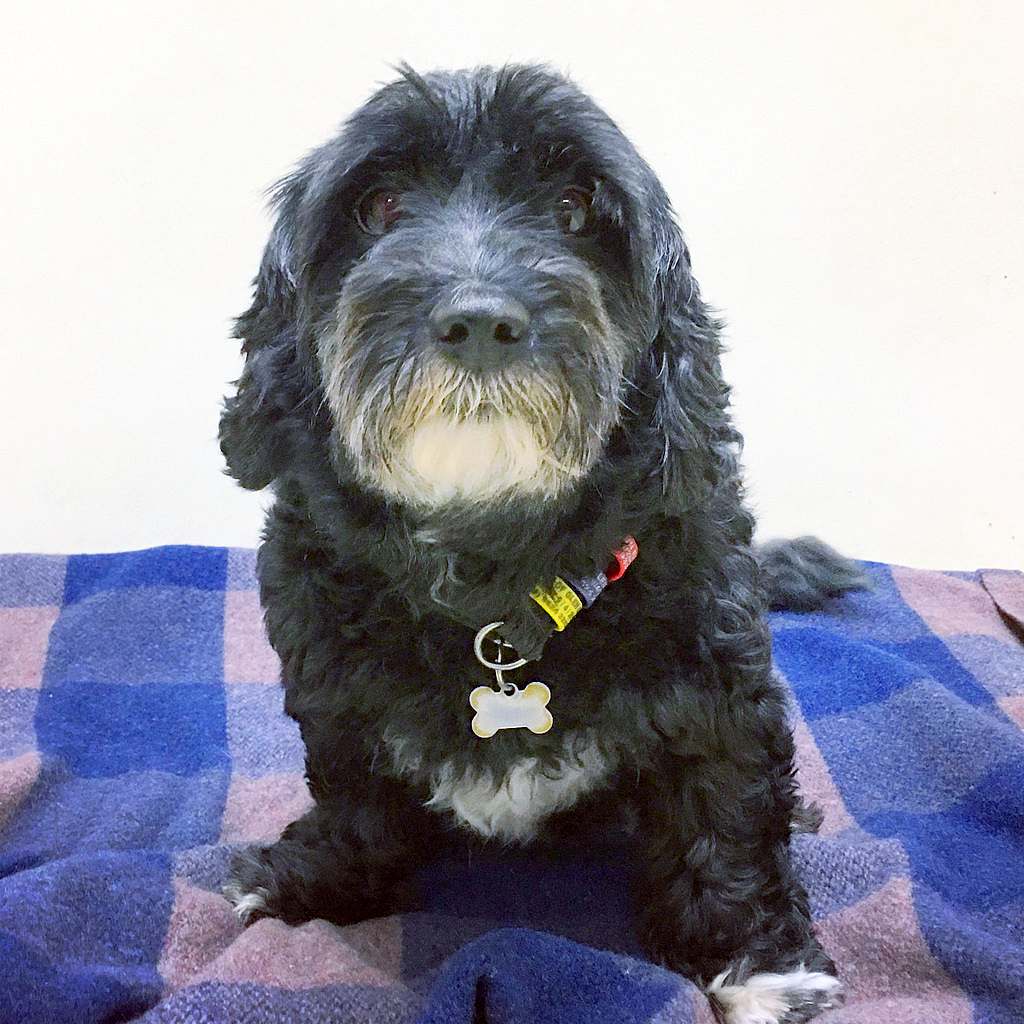
Shannon Stacey is the communications and media specialist at Lort Smith. To support the wonderful work of Lort Smith , please visit https://www.lortsmith.com
For further advice about pets in aged care, visit https://petfriendlyagedcare.com.au
What would your new shelter dog like you to know?
Giving a companion animal a second chance is highly ethical. It is also a powerful and practical way to improve their life.
There is something special about building a committed relationship with an animal from a shelter. Those who have done so should feel very proud of their achievements, particularly if it hasn’t always been smooth sailing!
As a new dog owner, you have likely had time to plan and imagine what life will be like when you arrive home with the animal.
The dog, however, has no idea what is going on, what to expect, or what is expected of them in their new home with you.
Right from the start, it is very helpful to be patient and empathetic.
By asking yourself what your dog feels and needs, you are less likely to become frustrated and more likely to think clearly. If you are thinking clearly, you are going to make good choices.
Commit at least a few full days together at the beginning because relationships take time to build.
By being present, you are helping the dog to adjust. It also provides you with the opportunity to adjust your plan if you notice behaviour that was not expected.
Know dog body language. Shelter staff, professional dog trainers and veterinarians are experts at reading dog body language so that they can avoid damaging relationships with dogs and keep themselves safe.
You will set yourself up for success if you know when to provide space for the dog and how to manage its environment.
Don’t scare or overwhelm the dog or you risk delaying or damaging your relationship.
Until you have built a foundation of trust, it is not a good idea to invite over an army of family and friends or to take the dog to busy public places such as cafes or dog parks.
Your dog needs time to build trust and adjust to life outside the shelter. Some undesirable behaviour may be the result of confusion or anxiety about their new situation.
Many problem behaviours can be reduced or eliminated through patience and the passing of time. However, if behaviour doesn’t improve in the first few weeks, working with a professional positive reinforcement trainer is a great idea.
While information about your dog's past may be helpful, it may also be detrimental to form opinions based only on their history.
To plan your future with the dog, the goal should be to assess your current situation and the dog's behaviour since coming to live with you.
Dogs are individuals and some take more time to adjust than others.
Time, patience and empathy often solve many problems in the first few months.
If you remain concerned, seek advice from the shelter where you adopted the dog or from a professional dog trainer before making big decisions such as surrender or rehoming.
This article was written by Jodi Harris, Delta Dog Trainer, Cert IV Companion Animal Services, Administration Officer - Dogs’ Homes of Tasmania.
-----------------
References:
Coren, S, How dogs think – understanding the canine mind, 2004, Psychological Enterprises, UK
Donaldson, J, Dogs are from Neptune, 1998, Lasar Multimedia Productions Inc, Quebec
McConnell, P.B, London, K.B, Love has no age limit – welcoming a new dog into your home, McConnell Publishing, 2011, USA
THERE is a desperate need for Councils to provide desexing subsidies for residents on low incomes to help prevent the current unplanned ongoing explosion of cats in Australia!
In most Australian cities and towns, many more cats than dogs are wandering, being lost or abandoned and killed/euthanized in pounds and shelters, or having to scavenge for food and a safe place to live around shopping centres, factories, hospitals and schools, or in someone’s backyard.
AWLQ’s National Desexing Network (NDN) receives up to 50 calls daily from people around Australia needing financial assistance to desex their pets or a stray cat they have been feeding, with many more applying for NDN vouchers on-line. Often, they have shown compassion by taking in a stray cat, who then has an accidental litter of kittens. Before they can desex the mother cat (after her milk has dried), and find homes for the kittens, the cat is already pregnant again, and the kittens often as well! Many are still unaware that cats can become pregnant from 4 months of age and can breed continuously!
The NDN team often cannot find enough support to offer these callers. A small proportion of vet clinics participate by offering discounts to pension/concession card holders and animal organisations struggle to raise funds to provide subsidies. Some Councils provide some subsidies of $20 - $50 to go toward desexing cats or dogs, which is often not enough to enable residents on low incomes to afford the typical veterinary charges to desex their pets.
The Australian Cat Action Plan was developed as an initiative of AWLQ’s Getting to Zero (G2Z) program, to encourage consistency across states and territories in effective strategies to prevent unwanted cats. One of the key strategies is for Councils to budget annually over several years for an ongoing Cooperative Desexing Program to help residents in need to desex their cats, or an unowned stray cat they may be feeding.
The NDN Cooperative Desexing Program for Councils was developed to be fair to all parties. The owner on a low income pays a little, currently $55 for a female cat and $35 for a male cat, or any additional female cats, which most people can afford out of their weekly pension or low salary. Participating vet clinics agree to charge a set fee, currently $90 to desex a male cat and $120 for a female cat which covers all veterinary costs including wages and materials. Councils pay the gap, currently $55 for a male, and $65 for a female, cat. This subsidy to prevent an unwanted cat is much cheaper for Councils than having to collect, hold and kill an unwanted cat, which costs approximately $250, with an additional approximately $500 to desex, microchip, treat for fleas/worms, and for any injury or illness from stress, and care for if the cat is rehomed. With the current oversupply of cats, rehoming can take months.
As well as reducing costs, a Cooperative Desexing Program is proactive in preventing nuisance issues, feral cat populations and impacts on wildlife. It reduces euthanasia rates. Also, if State Governments and Councils are implementing laws which require cats to be desexed, as many now are, such a program is necessary to provide support for residents in need so they can comply with these laws. Where discounted registration is provided as an incentive to desex cats and dogs, often residents on low incomes can’t afford to register their animals, because they can’t afford to desex them to receive the discount.
Currently several Councils are budgeting from $10 000 - $50 000 for NDN Cooperative Cat Desexing Programs.
It is time for all Councils to budget for a Cooperative Cat Desexing Subsidy Program. State Governments should provide incentives to Councils to start and continue these programs as a regular budget item. Even the Federal Government who fund the Threatened Species Strategy should be providing funds to prevent unwanted cats in cities and towns, and on farms, rather than try to track cats down after they breed and become feral. It is more logical, economical and ethical.
So, if your Council currently does not fund an effective ongoing desexing program, please contact the Animal Management Department Manager, and encourage them to budget for a Cooperative Desexing Program.
They can go to the NDN website to Get Involved/Local Councils and submit their details for information and support (https://ndn.org.au/national-desexing-network/local-council/) or email NDN admin@ndn.org.au.
If your Council does offer an effective desexing subsidy program, email NDN also, so that this program can be shared on the Australia-wide NDN directory for more people to find.
This article was contributed by Joy Verrinder, Strategic Director at AWLQ.
Have you heard more talk than usual about the microchipping and desexing of pets? Well that might just be because South Australia have introduced new laws for mandatory microchipping for all dogs and cats, puppies and kittens and mandatory desexing for all new litters of cats and dogs from 1 July 2018 (exemptions apply for working dogs, registered breeders etc.).
Now that is clear, you may then find yourself asking “what can we expect the outcomes to be of these new laws”? The simplest answer to this question is the AWL expects that these new laws will increase the number of reunited lost animals with their owners, while decreasing the number of unwanted and abandoned litters of kittens and puppies in shelters. WIN-WIN!
Why microchip?
Microchipping is a safe and permanent way to identify your pet for life, ensuring that you’re always able to be reunited.
Of the 7,200+ stray animals handed over to the AWL from July 2017- July 2018, only 150 were microchipped which represents only 2% of animals!

While collars and ID tags are an important part of identifying our pets, these items can easily fall off, or even be taken off, a microchip is the most reliable and effective way to ensure your local council/vet/shelter can contact you if your pet is lost.
The importance of updating microchip details
It’s a sad reality that even when your pet is microchipped, if your details aren’t kept up-to-date you may not be able to be reunited with your pet.
Of the 150 microchipped, stray, animals handed to the AWL from July 2017-July 2018, only 50 animals were able to be reunited with their owners. Despite every effort being made by the shelter to locate the owners, this is only 33% of microchipped animals being reunited!
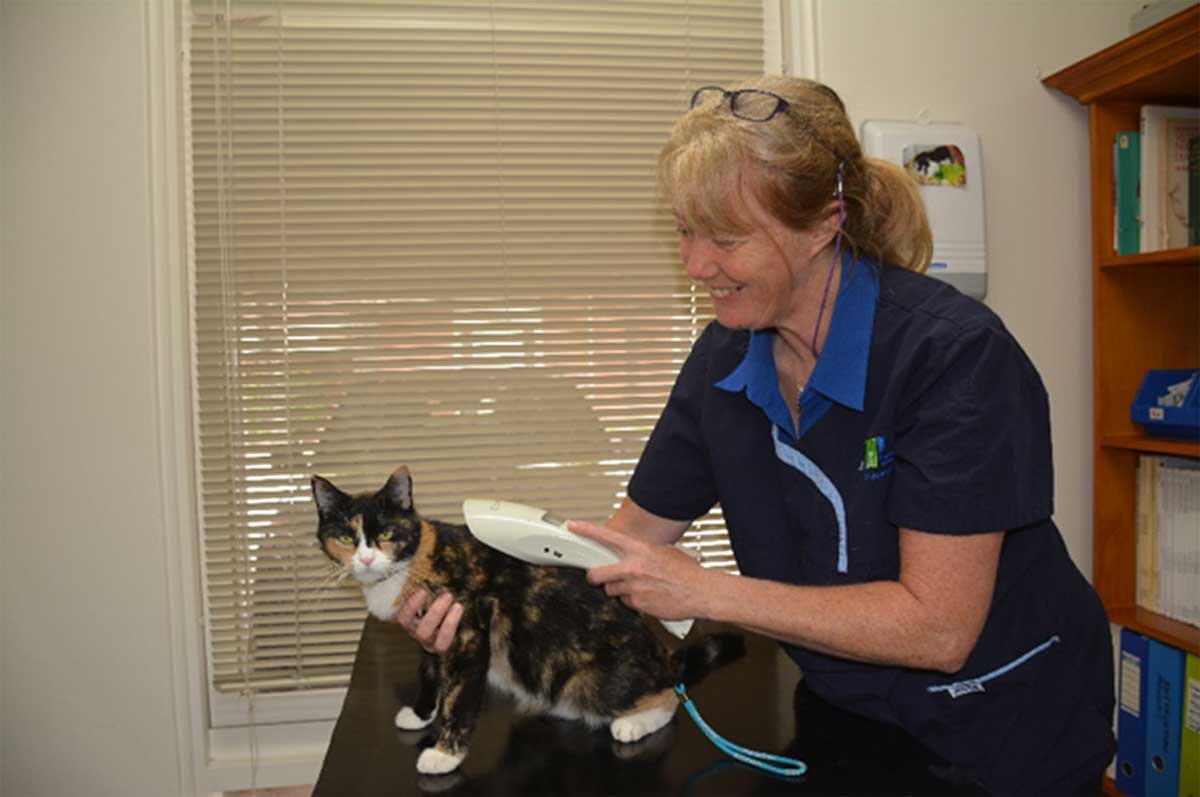
FINDING OWNERS: AWL veterinarian, Dr Alison, scans a cat for its microchip.
More often than not these difficulties arise as owners have relocated, changed numbers and even names (!) since they first microchipped their animal and then have not notified their microchipping company of these changes.
Updating your pet’s microchip is as simple as contacting the microchipping company that your pet’s microchip information is stored with. You can find out which database this is by entering your pet’s microchip number into the Petaddress search - http://www.petaddress.com.au/
Why desex?
Each year there are thousands of unplanned and unwanted litters of puppies and kittens born and finding homes for all of these animals is very challenging for animal shelters and rescue groups. Indiscriminate breeding can also result in genetic or temperament problems being passed on.
Benefits of desexing
Desexing reduces the tendency for aggressive behaviours towards people and other animals and helps reduce territorial behaviour. It can also help control the urge to wander and reduces anti-social behaviours such as lug humping and urine marking.
Studies have shown that a desexed pet has a reduced risk of cancer and other diseases of the reproductive organs and therefore increases the likelihood of a longer and happier life.
Financially there is also a benefit to having a desexed pet as you will receive a discount on registration and also not incur the costs for an unwanted litter.
In an effort to improve the management and welfare of dogs and cats in South Australia, a variety of new, state-wide, laws have been introduced, including:
- Mandatory microchipping of cats and dogs
- Desexing of dogs and cats born after the 1 July 2018
- New rules for breeders who sell dogs and cats
- Introduction of a statewide database, called Dogs and Cats Online
The AWL team are looking forward to seeing a decrease in numbers of lost animals entering shelters, as well as a decrease in unwanted litters of kittens and puppies being surrendered or abandoned.
Imagine you are living alone with a beloved dog or cat. They are your family, your companion, your best friend. You want to go out but you don’t want to leave them behind.
Imagine that you don’t have a car or can’t afford a car. You can’t walk terribly far but you can manage to catch a bus. And there is a bus or a train running past the door.
You want to take your dog with you to visit other dog-owning friends, to sit at a dog-friendly café or pub, go to a dog park, and meet other dog owners, like you, and to get to the vet for regular check-ups and in an emergency.
Pets are allowed on public transport in the UK and extensively across Europe, in North America, and recently too in Wellington, New Zealand!
In most places, this has been happening for years.
Requirements on pet owners differ by city and by form of transport (this can be trains, trams, ferries, buses etc.) but the intention is the same - pet owners can travel with their pets on affordable and accessible public transport systems.
A recent study by Dr Jennifer Kent and Professor Corrine Mulley (University of Sydney) showed the significant economic and public transport benefits of pet-friendly public transport.
For example: in a sample of 1,257 dog owners who made 9635 dog-related trips per week, 4,832 of these trips started in a private car – this means households are making 3.8 dog-related trips by car per week. With 1.6 million households in Sydney and 39% of these households own one or more dogs they estimated that some 2.4 million dog-related private car trips could be occurring in Sydney each week!
Sydney and Victoria allow pets to travel on some forms of public transport under strict conditions.
However, many places in Australia do not yet have pet-friendly public transport. This is a particular issue for older Australians who want to use public transport and, in some cases, have no other affordable option.
If you have a pet and you can’t now take your pet on public transport, please contact your transport authority and tell them how important your pet is to you and ask ‘Why can’t I use public transport with my pet?’
Make sure to tell them what it would mean to you to be able to take your pet on public transport. If you get an answer please post it on this blog.
We are especially keen to see this made possible for older and isolated pet owners.
Australia has one of the highest rates of pet ownership in the world. Let’s make Australia truly a pet-friendly country, in the interests of millions of pet owners and their pets.
If you are in the ACT, please contact Meegan Fitzharris MLA, Minister for Transport, GPO Box 1020, CANBERRA, ACT 2601 or email fitzharris@act.gov.au
This article was written by Pets and Positive Ageing Inc and published with their permission.
Contact: secretary@petsandpositiveageing.com
Jan Phillips, President - 0412 411 424
By Dr SIMONE MAHER
I have never really harboured more than a cursory interest in guinea pigs, and certainly never desired one as a pet. And then a funny little creature called Yenoe made his way into the clinic – and with his toupee-like coat, amenability to handling and adorable little paws, I finally understood the attraction.
Guinea pigs belong to the rodent family and are native to South America. Often considered a childrens’ pet, they are frequently inexpensive to purchase and like many other “pocket pets” their true requirements are often not understood and they commonly suffer ailments secondary to poor husbandry.
Whilst guinea pigs are often social and inquisitive little creatures quite happy to be handled (if this is done gently and appropriately from a young age), they are fundamentally a prey species. They are always on high alert for danger, which elevates their stress hormones and heart rate – long term, this can be tough on their little bodies.
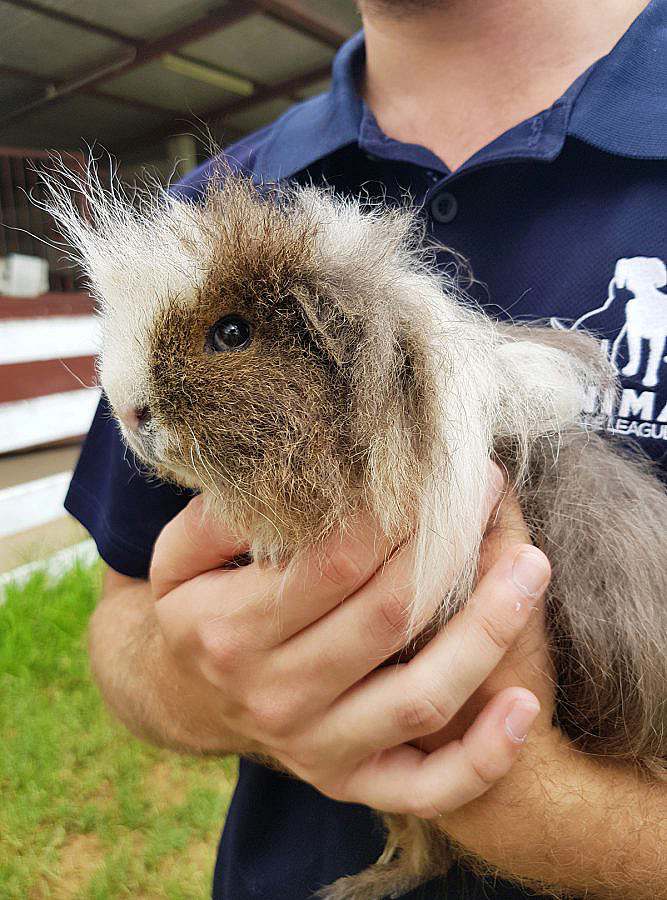
It is important to take this into consideration when designing their living spaces. They need to be able to retreat from noise and potential predatory animals. Whilst your dog may simply be thinking “a new playmate! Fun!”, your guinea pig is probably thinking “eek! I’m about to be breakfast!”. They are not well equipped to cope with extremes of temperature and humidity and generally speaking, if it’s uncomfortable for you outside, it’s uncomfortable for them. They should be kept in small groups – but remember, entire males may fight – and male/female pairs may get along a little too well. It’s not recommended to mix guinea pigs and rabbits.
A guinea pig’s teeth will grow continuously throughout its life. They need a high fibre diet; naturally they are grazing grass eaters. The major part of their diet should be grass or grass hay, with fresh leafy greens and herbs offered. Guinea pig pellets should be provided in small amounts only, and must be of a high quality. Avoid cereals, seeds, nuts, sweets, peas and chocolate. Early introduction to a wide variety of foods is important to avoid food aversions as they get older.
The life expectancy of a guinea pig is 5-8 years. Treat them well and they can be a delightful, pocket sized companion. And if they’re anything like little Yenoe, their funny little quirks – and hairstyle – will bring you endless merriment.
Enhancing our pets’ lives through their senses
By Dr Jo Righetti
We all hope that pets in our care are happy, carefree and suffer the minimum stress possible. Unfamiliar shelter environments may have our dogs pacing or barking and our cats’ toileting inappropriately or hiding. Even our normally relaxed pets at home become stressed on occasion – thunderstorms, car travel, guest in our homes.
Some simple sensory measures involving both stimulation and relaxation, may help to relax animals…
Auditory Stimulation
Music
Music helps pets calm down and most will lie down and relax when played music:
- Shelter dogs bark less when played classical music
- Pop music, although perhaps preferred by staff, has little effect on dogs
- Heavy metal really stirs them up and increases barking
- A mix of classical and reggae should relax everyone
Changing musical genres keeps dogs listening. Beware, however, when the music stops, the barking starts!
Audiobooks
Voice relaxation is also possible in dogs. The calming tones of audiobooks helps dogs lie down and relax and reduces vigilant behaviour. If not audiobooks, we could leave a radio on, tuned to talkback radio. We don’t yet know the effect on cats but, chances are, soothing voices will relax them too.
Look out for pain
There is a link between canine noise sensitivities and pain. Hearing a disliked sound may cause the dog to move, causing more pain and further noise aversion. This is worse in ageing dogs. If you suspect your dog may be in pain, have a check-up with your vet.
Visual stimulation
Television and movies
Some pets love to watch television and others barely even notice the screen. Newer technology, with higher resolutions, are more appealing to pets, who may take notice of movements or animals on the screen. Most cats also enjoy iPad games.
While most of these visual media are out of financial reach of shelters, they may be something to add to the wish list.
Scent stimulation
Dog scents
We all know how wonderful and powerful the dog’s nose is, so using scent to enrich their lives is beneficial. Effects, tested in shelter dogs, included the following:
- Lavender and Chamomile reduce barking and movement in dogs
- Rosemary and Peppermint increase barking and movement
- Vanilla, Coconut, Ginger and Valerian reduce the levels of barking and movement
- Coconut and Ginger increase sleeping
Cats scents
Catnip or prey (rabbit) scents increased sleeping time and decreased standing and exploratory time. Catnip also resulted in play-like behaviour, for those cats that respond to it. Cats have little response to lavender.
Shelter sense stimulation
Animals spend more time at the front of the cage when scents are absent, so perhaps shelters need to keep relaxing scents for non-visitor hours. Potential adopters may find it entertaining to watch a dog engage with their scent-enhanced toy or a relaxed cat relax on their lap.
How can you enhance your pet’s senses and stimulate or relax them?
All of these sensory topics have been discussed on my website Pet Problems Solved.
Original references:
Dogs prefer Bach to Britney
Behavioral effects of auditory stimulation on kenneled dogs
‘Four Seasons’ in an animal rescue centre; classical music reduces environmental stress in kennelled dogs
The effect of different genres of music on the stress levels of kennelled dogs
The effects of audiobooks on the behaviour of dogs at a rehoming kennels
Stress-busting films for pets
The behavioural effects of olfactory stimulation on dogs at a rescue shelter
The influence of olfactory stimulation on the behaviour of dogs housed in a rescue shelter
The influence of olfactory stimulation on the behaviour of cats housed in a rescue shelter
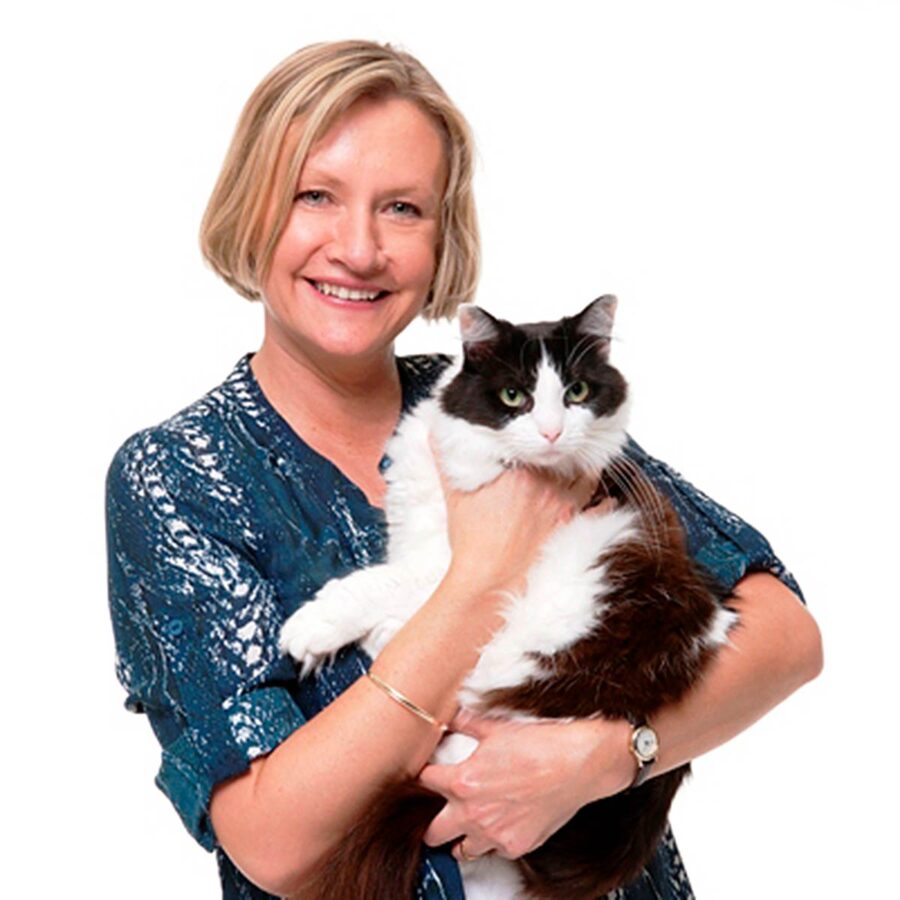
Dr Jo Righetti is the Australia CAN Ambassador. She is a PhD-qualified animal behaviourist, with 20 years experience in business. Dr Jo consults with a variety of companies, organisations, governments, vet clinics, universities and media. Her regular blog, Pet Problems Solved, is a wonderful storehouse of knowledge for people who love pets. Dr Jo lives with a dog & 4 cats.
By ANNE BOXHALL
Have you ever thought about fostering a dog or cat?
Nita and Deb are foster carers for SAFE Inc - Western Australia’s largest volunteer-based animal rehoming service.
For Nita, caring for animals on a temporary basis is a perfect fit for people who want dogs and cats in their lives but also want to be free to travel.
Fostering isn’t as hard as you might think says Nita. The satisfaction in helping many different animals outweighs the tricky part - letting them go!
It’s a privilege to take a dog in, love them, play with them, encourage them to trust humans again and watch them develop and grow.
Animals can relax and find their feet in a regular home environment, without the stress of being confined in an animal shelter.
We get to understand the personality of each animal and can tell adopters exactly what their new pet is like.
I get emails, phone calls and photos from adopters showing how happy the animals are and I always say that’s a job well done!
For Deb, being part of a joint effort with other SAFE foster carers saving thousands of animals' lives each year is incredibly rewarding.
In many ways, it’s not all that different to minding someone else’s pet because the dog or cat will always have another home to go to.
So when people say, I couldn’t foster because I’d get too attached - yes you might – however you are also playing a vital part in bringing the right pet and the right family together.
Author Lisa Lanser Rose puts it best when she says sometimes you do get attached, but so what? Yes, love hurts! Dogs and cats are out there hurting right now. You can do it, at least give it a try.
For more on foster caring, contact SAFE Inc at safe.org.au or your nearest ACAN member in other states.
Anne Boxhall is Executive Officer of Animal Welfare League Australia's West Australian member organisation, SAFE Inc.
Volunteers make a very important contribution to our three shelters at Dogs' Homes of Tasmania. They have all levels of experience, from recent inductees to those with more than 20 years of service.
Volunteers often form long-lasting friendships. Their mutual love of dogs always gets a conversation started, whether it be at one of our re-homing centres or when they are out in the community with one of the dogs.
Our volunteers perform many duties daily. Most start by walking all of the beautiful dogs on nearby bush-walking tracks. As they gain experience, and come along on a regular basis, the volunteers then get to help out in other areas of our operation.
And there's always plenty to do!
Dogs' Homes of Tasmania staff greatly appreciate this assistance because, without it, the dogs would not get the extra attention they need.
Some volunteers are unable to walk the dogs and so it's nice that they can help out in other areas, such as:
- General administration, gardening, grooming and bathing.
- Assisting staff with the rotation of the yards.
- Helping with fundraising activities.
- Taking a dog out for the day for general exposure to the community.
- Spending time with dogs who need a little extra help to rehabilitate them, and to make them feel safe and wanted.
All of our volunteers walk away with smiles on their faces, knowing that by being here they have helped bring benefits to 'man’s best friend'.
We work very hard to make the volunteers feel like part of the Dogs' Homes of Tasmania family. Despite our many different backgrounds and levels of experience, we have one important thing in common: the quest to make the dogs' stay a pleasurable one until their ‘furever’ home comes along.
As we celebrate National Volunteer Week, we say thank-you to all of our fantastic volunteers.
Our poem to our Volunteers
Dedicated hearts like yours
are not so easy to find.
It takes a special person to be
so generous and kind.
To care so much for our four legged friends
is a quality all too rare.
Yet you give of your time and talents,
for all of them in need to share.
So thank you for being a volunteer,
We're privileged to work with you.
We want you to know how appreciated you are,
not just today, but the whole year through.

National Volunteer Week May 11-May 17
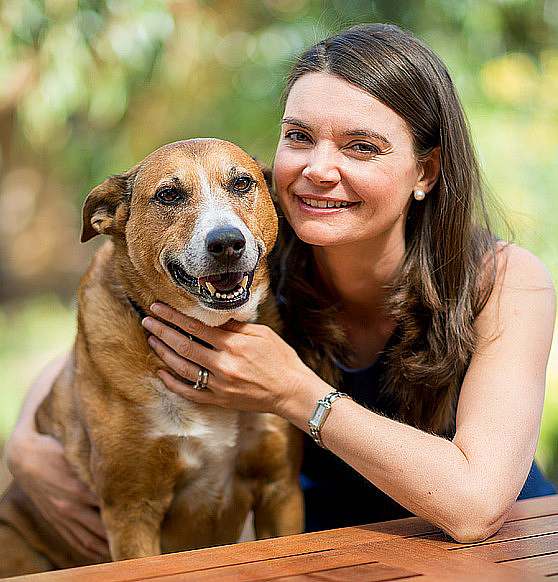
Since emigrating from the United Kingdom in 2001, foster care volunteer Ruth Simpson has guided more than 70 dogs into new, loving homes. One of them, Barney, was a homeless hound in urgent need of care when Ruth agreed to take him in more than 12 years ago. After a challenging start to the relationship, it soon became obvious that Barney had found his place in the sun.
By Ruth Simpson
It was late February 2003 and my boyfriend (now husband) and I had been volunteering at the Dogs’ Refuge Home for a little over 12 months, after emigrating from the UK to Perth in January 2001. We had become regular foster carers and already had looked after a litter of puppies and a dozen refuge inmates who needed a break from the kennel environment. On this particular day, I happened to be home when the phone rang and it was no surprise to hear the refuge’s trainer at the time on the other end of the line – he’d got to know that I in particular was a complete pushover for a homeless hound in need.
“I’ve got a dog here and he’s going downhill fast, if I don’t get him out soon I’m not sure if he’s going to make it,” said John. “Can you foster him?”
“I’ll leave now and see you in half an hour,” I replied.
And that was it. The rest, as they say, is history. That’s how Barney Simpson entered our lives.
Named Bruiser by his previous owner and surrendered to the refuge with a brother (who we never met), this kelpie/staffy cross was, to put it mildly, absolutely terrified. In fact, after all this time, he’s still the most terrified dog I’ve ever encountered.
John introduced me to him in the training field where he cowered at my feet with his tail between his legs and proceeded to shake violently. Who knows what happened to this eight-month-old puppy? Had he been violently abused, or had he just been left in a garage somewhere receiving zero socialisation, meaning the outside world was a terrifying place. Either way, I agreed with John that this dog was badly in need of help.
And so, Barney Simpson left the refuge with me that day. He had to be carried to the car and immediately hit the deck, ducking below the window line during the half hour drive home. I still remember to this day pulling into the driveway, opening the back of the car and him staring back at me, probably wondering what I was going to do to him. It was impossible to prise him from the car, so I enlisted the help of a neighbour and we lifted him out, while all the time he shook violently. I recall thinking, if ever a dog’s going to bite me it’s now, he’s absolutely terrified, but he didn’t and that moment marked the rehabilitation of the dog I love with all my heart.
To say the next six months were challenging was an understatement. Barney hid behind the garden shed for the first three months, only being coaxed out occasionally for food. I spoke to the trainer at the refuge to ask his advice – “What do I do to help this dog?” I said. “Keep pulling him out of his comfort zone,” he replied. And so, I slowly started taking Barney for a walk to our local park. These ‘strolls’ were highly embarrassing because Barney didn’t want to go for a walk, he didn’t want to leave the backyard and in fact “walks” consisted of me dragging him up the road while he tried to scoot into every passing bush to hide. When he wasn’t cowering behind a large native plant, he had the brakes on, refusing to go anywhere.
After many weeks of this, we decided that we couldn’t handle this dog, and thought he’d be far better off being rehomed by someone with lots of time and patience – and most of all someone who knew what they were doing. And so, given my background as a PR consultant, and because I was also volunteering at the refuge doing their publicity, I decided to do a story on Barney in the local paper, which was published by the incredibly supportive Subiaco Post, which still publishes countless dog stories for the refuge every year.
To cut a long story short, Barney was rehomed three times, and each time he came back to us. Eventually, we came to the realisation that perhaps he had decided where he wanted to live. He had unfortunately proven quite destructive in other people’s homes, but with us he was never naughty, just very scared.
And so, after he returned back to us from his third trial home, Mark and I were worn down by his beseeching eyes and gentle, though anxious, nature which by this time saw him velcroed to our side. We decided that he wanted to live with us, and so in June 2003 we made the decision that he was meant to be ours, and off I went to the refuge to officially adopt him, still, to be honest, wondering how things were going to work out.
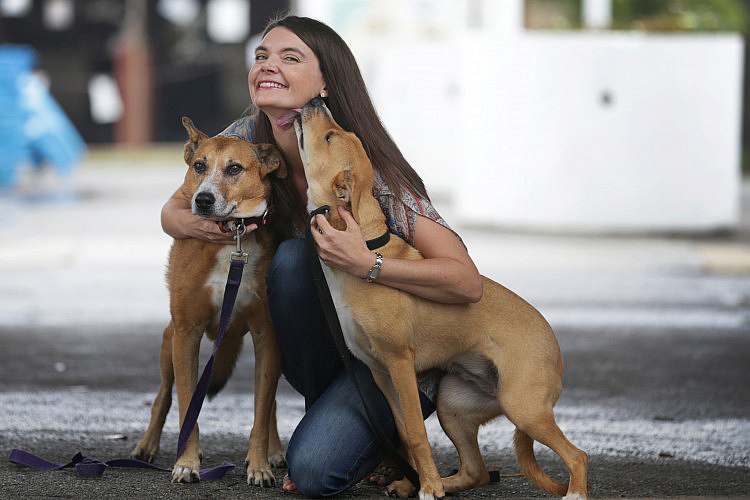
That was 12 years ago now, and when I think back to those days, as I write this, I’m filled with nostalgia. Mark and I were 30 and Barney was with us throughout that whole decade – and I’m pleased to say he’s in his usual position, asleep at my feet as I write this, in fact I can hear him gently snoozing.
I can honestly say that Barney has had the best life I think a homeless dog could have. He has had constant company, given I work from home, which is just as well as he never likes being left on his own – but that’s okay because he hardly ever is. Barney has been camping with us, slept in the tent with us, he was pictured in pretty much every photo when we spent several years renovating our old 70s house – and for much of that time he had splashes of white paint all over him given he was never far from our side as we painted walls and ceilings. Barney has joined us on beach holidays, weekend breaks and countless trips spent down south with friends and their own four-legged rescue dogs. When he hears the tailgate of the car go up – he immediately jumps in and adamantly refuses to get out – even if that means boxes, bedding, food and all the paraphernalia needed for a trip away is slotted in around him.
But the most wonderful thing about Barney is that, over the 12 years we’ve had him, he has enabled us to foster over 70 other homeless hounds in need of help. During that time, we have been foster owners for the Dogs’ Refuge Home, who we will always support as they were the wonderful organisation that rescued him in the first place. On occasion, we have also fostered for other rescue groups that have had particularly desperate dogs needing help, including Wish Animal Rescue, SAFE and even Rottweiler Rescue. And Barney has (mostly) welcomed them into our home, whatever their size, shape, temperament or age. He’s shown them what to do, where to pee, how to behave and even how to find the patches of sunlight that he adores and seeks out throughout the day as the sun moves over our house.
We have been proud to help transition all of those 70 dogs into new, loving homes – and we managed to resist adopting any of them, believing that as long as they found wonderful homes it was as good as us keeping them. But inevitably, we were bound to foster fail again at some point – and this has only just happened, in March 2015, when by chance I happened to see a Gumtree post about a stray dog that was abandoned in Lancelin on the Australia Day long weekend. I contacted the person who had found her and offered to help transition the pup to the safety of the Dogs’ Refuge, which resulted in a five-hour drive to rescue her. And because the shelter was full at the time, she came to our house during her quarantine period. Again, the rest is history, and we ended up adopting Poppy the puppy, another scared little girl who is the spitting image of a young Barney but who is growing in confidence every day.
If there is one thing I could wish for, it would be to enter Barney’s head and scrub out all the bad things that happened to him in his first eight months of life, before he was rescued by the shelter and came to live with us. But obviously that’s impossible, though I’d like to think that the wonderful life he has had – and continues to have – has possibly made up for the bad start he had in life. He’s certainly a completely different dog to the one we adopted over a decade ago. He adores his walks to the park and races up the street every morning, super keen for an adventure. He’s obsessed with the ball – and will do anything for it – which has been a great way to persuade him that life isn’t quite so scary after all. And most of all, he is the most wonderful ambassador for refuge dogs generally – in fact he’s living proof that a scared, nervous homeless hound can flourish into the most beautiful, happy, loyal companion that, given a second chance, will seize life and love it to the max.
Barney Simpson, you have made us laugh pretty much every day you’ve been in our lives, and have been the most loyal dog we could ever have wished for. Yes, sometimes I’m reduced to tears when I think that, at 13, you’re now in your twilight years – but hopefully you will have many more beach adventures, swamp walks, balls to chase, cuddles and treat-filled kongs. We love you Barney Simpson – and the newly arrived Poppy Simpson is becoming greatly loved too. What’s more, you prove that rescue dogs are the best breed of all.
– on behalf of The Simpsons – Ruth, Mark, Barney and Poppy
Ruth is Principal, Shine Communications, in Perth, Western Australia.


